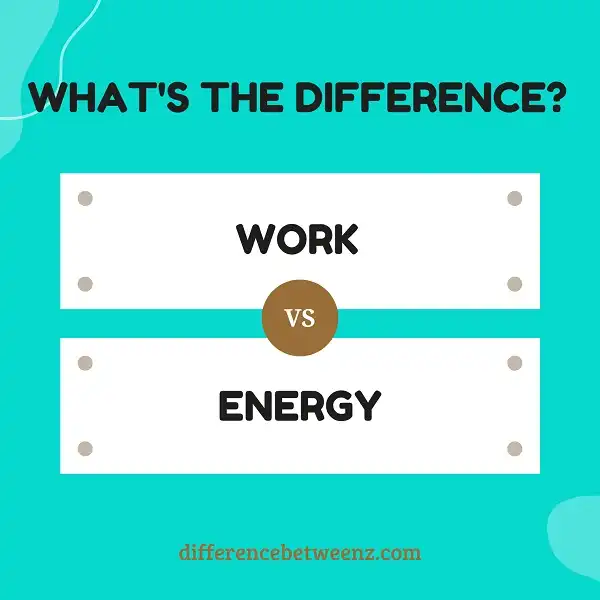In physics, work and energy are related concepts. Work is done when a force is applied to an object over a distance. Energy is the ability to do work. There are several types of energy, including kinetic energy, potential energy, and thermal energy. In this blog post, we will discuss the difference between work and energy, and explore how they are related. We will also explore some applications of work and energy in everyday life. Stay tuned!
What is Work?
Work is a concept in physics that has multiple definitions, each of which is related to the others. The most common definition of work is force times distance. This equation implies that work is done when an object is moved in the direction of the force. Work can also be defined as the amount of energy required to move an object from one point to another. In this case, work is a measure of the amount of energy required to overcome the forces acting on an object. Work can also be thought of as a measure of the amount of energy that is transferred to an object when a force is applied to it. The unit of measurement for work is the joule, which is equal to the amount of energy required to move an object one meter in the direction of the force.
What is Energy?
Energy is a term used in physics that has multiple meanings. In the most basic sense, energy is the ability to do work. Energy can be found in many forms, such as thermal, electrical, nuclear, and mechanical energy. Energy can be converted from one form to another, and it can be transferred from one object to another. The SI unit of energy is the joule, which is equal to the amount of work done when a force of one newton moves an object over a distance of one meter. Energy can also be measured in calories, which is the amount of energy needed to raise the temperature of one gram of water by one degree Celsius.
Energy is an important concept in physics because it helps us to understand the way that matter behaves. Energy is conserved, meaning that it cannot be created or destroyed. This principle is essential for understanding many physical processes. Energy is also responsible for the movement of particles and for the interactions between particles. Without energy, the matter would not be able to move or interact. Understanding energy is essential for understanding how our universe works.
Difference between Work and Energy
Work and Energy are two important concepts in physics. Work is defined as being done when an object is moved over a distance by an applied force. The SI unit for work is the joule (J). Energy, on the other hand, is the capacity for doing work. It is a property of objects that can be converted into work. The SI unit for energy is also the joule (J). While similar, these concepts are distinct from one another. Work is a measure of how much force is required to move an object over a distance, while energy measures the capacity to do work.
Energy is often thought of as the ability to cause change, while work is the actual act of causing change. Work requires the transfer of energy, but not all transfers of energy are considered work. For example, when a rock sits at the top of a hill, it has potential energy because it has the potential to do work (by rolling down the hill) but it isn’t actually doing any work. Work can only be done when there is a force acting on an object to move it over a distance. Thus, while all forms of energy can be used to do work, not all forms of energy are considered work.
Conclusion
Work and energy are two important concepts in physics. In this blog post, we’ve explained the difference between work and energy. We hope you found this information helpful!


